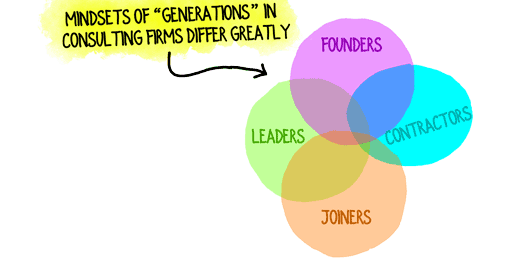You’re different from other people. Your Mom always said so, and when was she ever wrong?!

Tools like DISC, Herrmann Brain Dominance Instrument, Kolbe A, StrengthsFinder, BCPI and other tools are popular because smart folks like you know that understanding different types of people is important.*
Set aside personality types for the moment, though, and consider the different “generations” at your consulting firm, which are described below. (Even if you operate a solo consultancy, you still work with others.)
Consulting Firm Generations:
Founders, Leaders, Joiners (and Subcontractors)
Founders
The “first generation” inside a consulting firm. The folks who build a firm from zero. They start with nothing more than intentions, hopes, a healthy supply of chocolate and, if they’re fortunate, a couple of anchor clients.
Leaders
The “second generation” inside a consulting firm. They grow up in the firm, taking on increasing levels of responsibility or they’re hired in at a senior level based on their consulting experience elsewhere.
They sit on the leadership team, oversee significant portions of the firm’s strategy, delivery, infrastructure and/or business development.
Joiners
The “third generation” inside a consulting firm. They join the firm low on the totem pole (analyst, intern, hot-cocoa preparer), or after the firm is already stable and well-established. Some Joiners will grow into Leaders.
Contractors
Freelancers, subcontractors and virtual employees are a standard ingredient in the consulting mix these days. Typically, contractors are running their own, small practices and have a mix of mentalities that cross the generations.
The mindset in each generation is distinct and the contrasts can be starker than a butterscotch chip in a chocolate fudge cookie.

You’ll enjoy far more success with far less frustration when you factor the generational differences into how you hire, manage, inspire, reward, and deploy the individuals who contribute to your consulting firm.
For example, look at the mindset differences between Founders and Joiners that massively affect their approaches to Business Development:
Founder Mindset
Joiner Mindset
Entrepreneurial – Strong desire to build business
Worker – Strong desire to do good, meaningful work
Highly resilient – Experienced at bouncing back from “No”
Careful – Avoids situations that can lead to a “No”
Sacrifice for sales success – Willing to set aside other life priorities to hit sales targets
Sacrifice the sale – Building the business and achieving sales are not primary life goals
Sales oriented – Knows success/future depends on winning engagements
Work oriented – Success can be achieved without participating in Business Development
Embraces sales – Doesn’t view Business Development negatively
Disdains sales – Harbors negative views of Business Development and selling
With such different outlooks, it’s no surprise that Founders fail when they exhort the next generations to emulate the Founder’s approach to Business Development.
I’m very interested in your input. Do you see any differences in mindset, attitude, or approach between generations?
Text and images are © 2024 David A. Fields, all rights reserved.

 David A. Fields Consulting Group
David A. Fields Consulting Group 

Such a succinct and clear perspective on a phenomena that I’ve obseerved countless times, but never been able to codify or articulate… until now!
Thanks David.
I’ve often heard founders preaching to the teams that “sales is everybody’s job” and “we’ve all got a stake in the success of the firm” – now I can see what’s happening, and why it rarely works that well, because those joiners are made of different stuff right now.
There is a lot to be said for creating a growth culture, and this is a useful reminded that we also need to recognise and accept these different mindsets too.
Ben, your note about growth culture is perfectly said, and your example eloquently captured what we’ve seen more times than we can count. (Some) mindsets can be changed. Joiners can grow into leaders. Leaders rarely grow into founders or, if they do, they spin off and found their own firms!
Founders make the mistake of thinking they need more founder-type people for their firm to thrive. They don’t. Once a firm is past a certain stage, more leaders and joiners are needed. The Founder mentality has to start fading into the background or it will throttle growth.
Thanks for lending your experience to the discussion, Ben!
In my experience, Contractors usually bring highly valuable skills, but are often looking for an engagement to be shaped so it’s suitable for them. They tend to be less interested (and involved) in finding, shaping and developing a consulting engagement, although they do tend to be interested in winning the work! So in my experience it’s helpful to involve suitable contractors when developing opportunities, but it’s unrealistic to expect them to take the lead in business development activities for your firm. They have slightly different priorities, after all!
Setting realistic expectations for contractors is exactly right, Graham. Many firms use and treat contractors like full-time employees. Legalities and IRS restrictions aside, it can be an effective model from which both sides benefit. However, the contractors are not employees and have a different mindset which, as you point out, is not 100% aligned with the firm.
What are the mindsets of someone who works most of their time for one firm, yet remains a contractor? That is a question worth pondering if you use such contractors.
I appreciate your highlighting the subcontractor side of the equation, Graham!
David,
A few years back I inadvertently hired a “Joiner” in error, thinking they had more business development mindset and skills than proved true. I ultimately had to let them go because it wasn’t making sense financially. It’s easy to fall prey to the “similar to me” bias and think that others’ life views, values, and priorities are like your own.
Doc, your experience is the norm, not the exception. We all harbor the assumption that others see the world the way we do. Intellectually, we know that’s not the case, yet it’s often our starting point with colleagues, employees and potential hires.
Your example is a perfect illustration for the topic, Doc.
As a founder myself, your personas of the Founder and the Joiner are pretty smack on. With that said, joiners can (and do) grow and evolve with the firm.
One of my joiners started with me 10 years ago, and he started very similar to the persona you outlined above. However, over the years he’s developed a founder-like mindset about sales. He recognizes that to grow, which creates opportunities for everyone – including him – we need to sell.
His core skill set isn’t business development, but he recognizes the importance. And he’s brought in business from some of his clients.
At the end of the day, I’m going to need to be the rainmaker. But I’m working on growing my joiners into leaders, and have a couple of leaders that enable me to focus on the bigger picture of growth.
Tom, a founder like you who has patience and understands the development curve is in the best position of all. We’ve found we can “grow” joiners into leaders that are rainmakers in 2-3 years. Your experience is a good lesson to many readers.
One gentle point of pushback: at the end of the day, you need to not be the rainmaker, at least if you want the firm to outlast you. Some of your joiners can adopt a powerful, Leader mindset that does include rainmaking.
Thank you for extending and deepening the conversation, Tom!
I think that you are missing a necessary type of employe: Worker Bees. These folks come to work every day ready to do a good job at the job for which they were hired. They are not “Joiners” because they don’t really value the firm. They value their job and they may derive personal validation from doing a good job, but if the firm fails, they are going to be the first to jump ship to a new employer who can provide them a steady paycheck and, hopefully, fulfilling work. They are necessary because they are often the people you rely on to do the work that is low-value to the founder or leader but essential to keeping the firm running smoothly.
That’s an interesting perspective, Derek, and may point out that I didn’t express all of the mindsets of the Joiner. What you’re describing fits within the definition of the Joiner, who definitely should be a good worker bee. (Or else, why keep them in the firm at all?)
As you suggest, joiners are also the first to become leavers! More importantly, your comment alerts Founders and Leaders that they need to consider the motivations and loyalty, or lack thereof, of others in the firm. Not everyone is willing to sacrifice for the good of the firm.
Excellent addition to the conversation, Derek–thanks for jumping into the fray today.